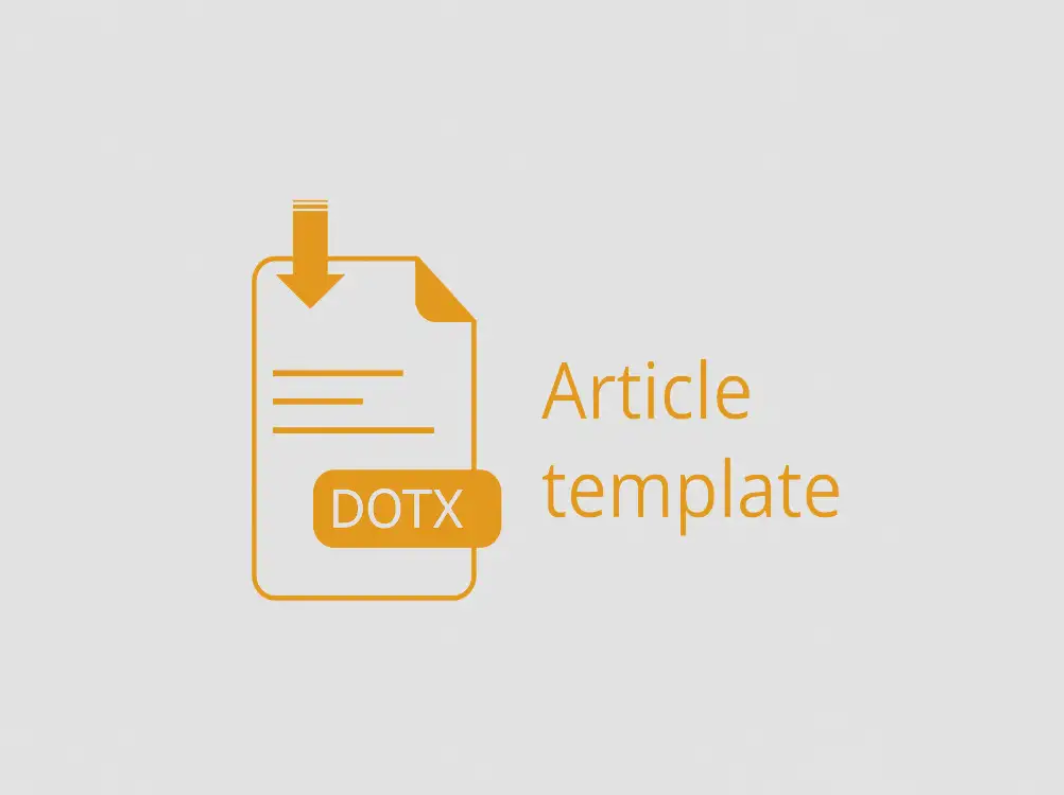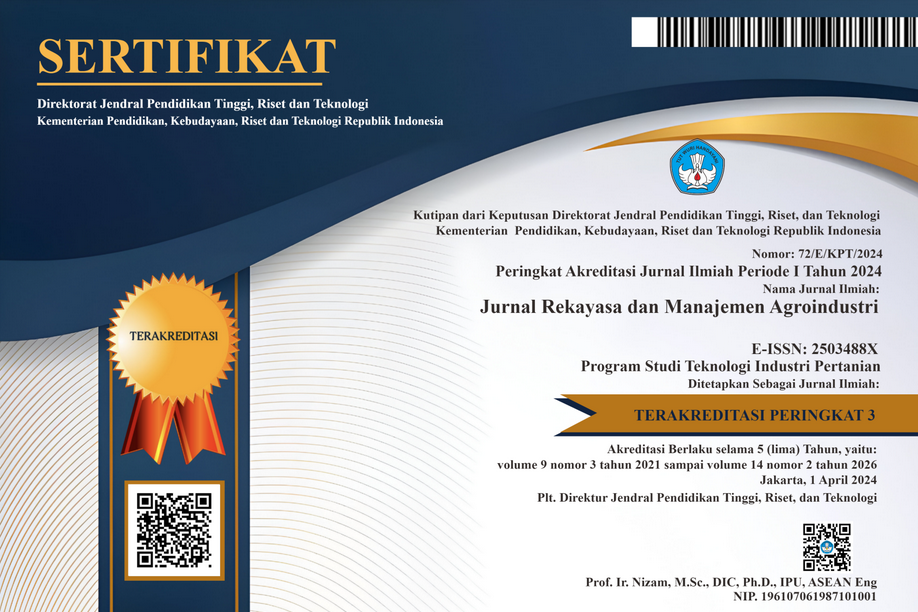Studi Perubahan Warna Dan Kekuatan Tarikan Eceng Gondok Hasil Pemutihan Menggunakan Hidrogen Peroksida
Abstract
Water hyacinth is an aquatic plant often used as a craft product because it is attractive for its various positive properties but requires further handling, especially regarding its color. White is one of the most popular types, and the manufacturing process involves bleaching stages using chemical compounds such as hydrogen peroxide (H2O2). The use of H2O2 in the bleaching process still has consequences for the quality of the material, which becomes easily damaged, and the bleaching process, which involves the presence of sunlight or ultraviolet lamps, occurs more quickly. This research examines the relationship between the duration of soaking water hyacinth in H2O2 solution in the presence of direct light or in dark conditions on its color and tensile test strength. Based on the research results, the Hue, Saturation, and Value (HSV) color data increase the brightness based on saturation and value data. Tensile test capability testing carried out using the Universal Testing Machine (UTM) instrument showed that immersing water hyacinth in H2O2 for 4-8 minutes did not cause a significant change in tensile test capability, so it was still possible for various purposes as a raw material in the creative industry.
Keywords: bleaching, hydrogen peroxide, water hyacinth, tensile strength
Eceng gondok merupakan salah satu tanaman air yang sering digunakan sebagai produk kerajinan karena memiliki daya tarik pada berbagai sifat positif yang dimiliki, namun diperlukan penanganan lebih lanjut terutama pada warnanya. Warna terang merupakan salah satu tipe yang banyak digemari dan proses pembuatannya menggunakan tahapan pemutihan menggunakan senyawa kimia seperti hidrogen peroksida (H2O2). Penggunaan H2O2 pada proses bleaching masih memiliki konsekuensi pada kualitas bahan yang menjadi mudah rusak, serta proses bleaching yang melibatkan kehadiran sinar matahari maupun lampu ultraviolet akan terjadi lebih cepat. Penelitian ini bertujuan melihat hubungan antara durasi perendaman eceng gondok dalam larutan H2O2 pada kondisi kehadiran sinar secara langsung maupun dalam kondisi gelap terhadap warna dan kekuatan uji tariknya. Berdasarkan hasil penelitian ditemukan data warna Hue, Saturation, dan Value (HSV) menunjukkan kecenderungan (trend) yang baik terutama untuk data saturation dan value. Pengujian kemampuan uji tarik didapatkan bahwa perendaman eceng gondok dalam H2O2 antara 4-8 menit praktisnya tidak menyebabkan perubahan kemampuan uji tarik, sehingga masih memungkinkan untuk berbagai keperluan sebagai bahan baku di industri kreatif.
Kata kunci: bleaching, hidrogen peroksida, eceng gondok, kuat tarik
Downloads
References
Deswal, M., and Sharma, N. 2014. A Simplified Review on Fast HSV Image Color and Texture Detection and Image Conversion Algorithm. International Journal of Computer Science and Mobile Computing, 3(5), 1216–1222.
Gottenbos, B., de Witz, C., Heintzmann, S., Born, M., and Hötzl, S. 2021. Insights into blue light accelerated tooth whitening. Heliyon, 7(2), e05913. https://doi.org/10.1016/j.heliyon.2021.e05913
Harun, I., Pushiri, H., Amirul-Aiman, A. J., and Zulkeflee, Z. 2021. Invasive water hyacinth: Ecology, impacts and prospects for the rural economy. Plants, 10(8). https://doi.org/10.3390/plants10081613
Islam, M. N., Rahman, F., Papri, S. A., Faruk, M. O., Das, A. K., Adhikary, N., and Ahsan, M. N. 2021. Water hyacinth (Eichhornia crassipes (Mart.) Solms.) as an alternative raw material for the production of bio-compost and handmade paper. Journal of Environmental Management, 294(June), 113036. https://doi.org/10.1016/j.jenvman.2021.113036
Liang, L., Cheng, L., Zhang, Y., Wang, Q., Wu, Q., Xue, Y., and Meng, X. 2020. Efficiency and mechanisms of rhodamine B degradation in Fenton-like systems based on zero-valent iron. RSC Advances, 10(48), 28509–28515. https://doi.org/10.1039/d0ra03125a
Liu, K., Yan, K., and Sun, G. 2019. Mechanism of H2O2 /bleach activators and related factors. Cellulose, 26(4), 2743–2757. https://doi.org/10.1007/s10570-019-02244-z
Mondal, M. I. H. 2002. Effect of hydrogen peroxide bleaching on sulphonated jute-cotton blended fabric. Indian Journal of Fibre and Textile Research, 27(3), 280–283.
Retnowati, D. S. 2008. Pemutihan enceng gondok menggunakan H2O2 dengan katalisator natrium bikarbonat. Reaktor, 12(1), 33–36.
Wang, X., Shen, X., and Xu, W. 2012. Effect of hydrogen peroxide treatment on the properties of wool fabric. Applied Surface Science, 258(24), 10012–10016. https://doi.org/10.1016/j.apsusc.2012.06.065
Zahara, R. 2022. Implementasi Hue Saturation Value (HSV) Untuk Identifikasi Fraktur Tulang. Resolusi : Rekayasa Teknik Informatika Dan Informasi, 2(5), 214–224. https://doi.org/10.30865/resolusi.v2i5.369
Zeronian, S. H., and Inglesby, M. K. 1995. Bleaching of cellulose by hydrogen peroxide. Cellulose, 2(4), 265–272. https://doi.org/10.1007/BF00811817
Zwirchmayr, N. S., Hosoya, T., Henniges, U., Gille, L., Bacher, M., Furtmüller, P., and Rosenau, T. 2017. Degradation of the Cellulosic Key Chromophore 5,8-Dihydroxy-[1,4]-naphthoquinone by Hydrogen Peroxide under Alkaline Conditions. Journal of Organic Chemistry, 82(21), 11558–11565. https://doi.org/10.1021/acs.joc.7b01827
RapidTables. 2024. HSV to RGB color conversion. https://www.rapidtables.com/convert/color/hsv-to-rgb.html. Diakses pada 20 Januari 2024.

Ciptaan disebarluaskan di bawah Lisensi Creative Commons Atribusi-BerbagiSerupa 4.0 Internasional.
Seluruh artikel di Jurnal ini dapat disebarluaskan atas tetap mencantumkan sumber yang syah. Identitas judul artikel tidak boleh dihilangkan. Penerbit tidak bertangggung jawab terhadap naskah yang dipublikasikan. Isi artikel menjadi tanggung jawab Penulis.














